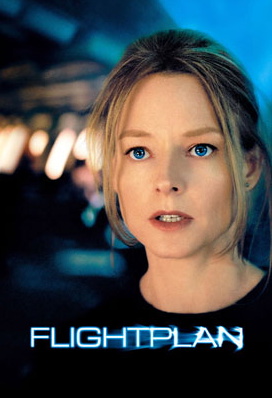
FLIGHTPLAN
US, 2005, 105 minutes, Colour.
Jodie Foster, Peter Sarsgaard, Sean Bean, Kate Behan, Erika Christensen, Mary Lawston.
Directed by Robert Schwentke.
Terror on a plane is a good old standby for a popular suspense thriller. We have seen plenty of hijackers, mad bombers, merciless terrorists. What about a distraught widow whose daughter disappears? And what about her name being missing from the passenger list? And what if passengers and staff are certain that they never saw the little girl? What would we do if we were the mother? (It helps if, as here, that the mother is an engineer and knows the designs of planes and where to look.)
A cautionary note of lack of realism needs to be made, especially for those who fly often. When the mother starts her cabin search for her daughter, all the toilets are vacant and there is no line for them. This certainly requires an enormous suspension of disbelief!
Despite that, the film works quite well in the suspense department. This is in large part due to Jodie Foster. A couple of years ago, she was menaced in her apartment (again with a daughter) by burglars while she hid in the Panic Room. This time she is a widow accompanying her husband’s body from Berlin to New York. In her grief, she remembers and imagines her husband. She comforts her daughter. She feels that men are prying from a neighbouring building. All this is enough to make us unsure when the on board crisis occurs. Did it happen? Well, we saw it all? But how could there be such a conspiracy against her? And when she goes over the top demanding the plane be searched, upsetting the passengers, challenging the crew, well Jodie Foster is so convincing an actress that we realise she must have imagined it all. But did she? And what happens when the plane lands?
Obviously it is far-fetched (we hope) and to criticise it for lack of realism is to have missed the point about this kind of thriller. It’s what if? rather than what really happens.
Sean Bean is the pilot who has to make the choices. Peter Sarsgaard is the air marshall required on flights after September 11th. Actually, the title gives away the intensity of the plot more than we might realise!
1.Successful disaster film? Terrorism? Heist? Combination?
2.The popularity of air disaster films? Audience identification with the dangers, the passengers? The what if?
3.The Berlin locations, the airports? The flight, the extensive interior of the plane, the plan, the reality, the decks, the lounges, the hold, the pilots’ area? How authentic? An invented plane – made to be credible?
4.The prologue, Kyle and the death of her husband, her grief? The plan to take the body back? Her relationship with her daughter? The grief, the vigil, the park? Seeing the men watching her from the adjacent building – and her suspicions on the plane? The arrangements, the authorities? Going to the airport, settling Julia down?
5.The relationship between mother and daughter, in the situation, her care for her daughter, age, tending her in the apartment, sleep? At the airport, going on board? The finger on the window of the plane?
6.Kyle? Jodie Foster’s screen presence? Dignity, as a mother, as a woman, concern? Going on board, settling Julia, going to sleep? Waking and finding Julia missing? The concern, the search – leading to panic?
7.The presentation of the crew: the pilot and his control, the various members of the staff, the flight attendants? Fiona and her concern? Stephanie and her objectivity? The other members of the crew? Their role during the flight, to keep order and calm, handling Kyle, the situation, the passengers and their being upset? The crew?
8.Kyle and her search, her causing a disturbance, her anxiety, going from deck to deck, upsetting the passengers? The reaction of Gene Carson? His trying to calm her? The lack of evidence that Julia was ever aboard? Going to the captain, banging on the door, his handling of the situation? Her continuing to go throughout the plane, her escaping custody, going down into the holds? Her knowledge, concern, her skill in pretending – in the toilet? Her growing panic – alienating the passengers, alienating the audience? The people criticising her? The two men that she thought suspicious and her attack on them?
9.Gene Carson, as a passenger, revealing himself as security? An air marshal? His taking control, collaboration with the staff? The searching?
10.The captain and his decision, contacting the destination, the decision to land? His believing Kyle – and the evidence against her?
11.The revelation of the truth about Carson, his sense of evil, the master plan, in collusion with Stephanie? Getting Stephanie to guard Kyle? His plan, the money, attitude towards the captain, the crew? The plan seeming to go well? His having Julia in the hold? The revelation of the plan, the murder of the husband, the cover-up, his suggestion to Kyle that Julia had died in the fall? Bringing the bomb on board in the coffin? His collaborators in Berlin?
12.Kyle, using her wits, pretending to go along with the arrangements? Her not leaving the plane? Pursuing Carson? The bomb, rescuing Julia? Closing the door, the detonation of the bomb?
13.The evacuation of the plane, Stephanie and her attitude, change of attitude? The arrests – and the arrests of the accomplices in Berlin?
14.The landing, the passengers, the kindliness of the man that Kyle had accused? Reunited with Julia? The attitude of the captain?
15.Audience reaction – the evidence of the mother and daughter going on board, the waking, thinking that Kyle had imagined everything, hysteria? Her erratic behaviour on the plane, her desperation? Audiences’ sympathy or turning against her? The reaction to discovering the truth?
16.An effective psychological thriller – the implausibility of the plot, the conspiracy, the action in the air? But satisfying action entertainment?